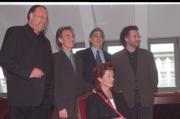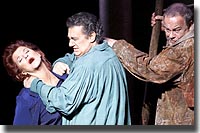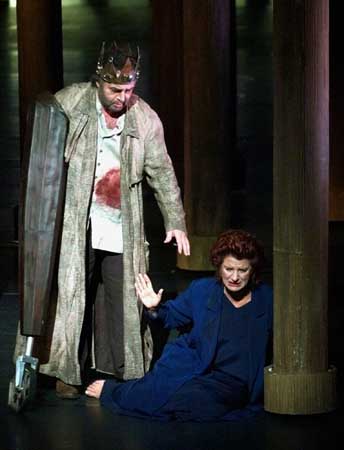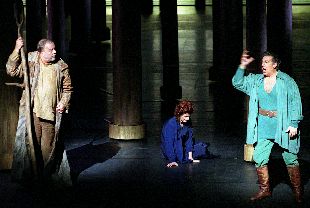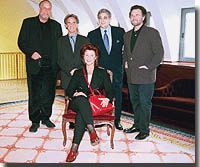Madrid, Parsifal
Jaume Radigales, Opera News (extended online edition), June 2001
...
Agnes Baltsa didn't seem to understand Kundry dramatically or musically. She conceived of the role as a woman devoid of emotion, and her singing has lost strength and character. She was a Kundry with the voice of a former Cherubino.
...
--------------------------------------------------------------------------------
Of quests and enchantments
Juan Ángel Vela del Campo, El Pais (Spain), March 5, 2001
...
Matti Salminen, the absolute winner of the night on individual terms, unravelled as Gurnemanz a lesson in singing from beginning to end. His phrasing, his intensity were shattering. Plácido Domingo returned to exhibit nobility, elegance and an instinctive melodic feeling, with the freshness of an exceptional middle register. Franz Grundheber shed light on the tragic component of Amfortas, employing a nuanced and dramatic singing line. Agnes Baltsa managed Kundry with more limited resources. Hieratic, distant and sometimes not at all secure in the emission, Baltsa let out nevertheless a few phrases that bear testimony to her class. The second act meant in any case a decrease in the vocal temperature and the unitary climate of the performance, in spite of the orchestral tension being maintained in the pit.
...
--------------------------------------------------------------------------------
The chalice in the crypt
Alvaro del Amo, El Mundo (Spain), March 5, 2001
[...]
Agnes Baltsa, representing the most mysterious creature of the story, Kundry (the witch and slave, temptress and wild child), has at her disposal a severe governess costume: her talent succeeds in avoiding that it distracts us from what she signifies. Her presence, slender and convincing, transmits the transitions that the passionate woman suffers, making it one of the great female parts in operatic history.
[...]
--------------------------------------------------------------------------------
The Real welcomes 'Parsifal' with 15 minutes of applause
EFE (Spain), March 5, 2001
Richard Wagner's last opera returns to the Madrid theatre after an absence of 80 years
The audience of the Teatro Real welcomed the new production (co-produced with London's Covent Garden) of Wagner's 'Parsifal', which returned with a luxury cast headed by Placido Domingo to the Madrid theatre on Saturday after an absence of 80 years, with 15 minutes of applause.
The tenor from Madrid and the bass Matti Salminen, sharing the stage with the baritone Franz Grundheber and the mezzo Agnes Baltsa, received the biggest ovations on a night in which the public of the Real, generally reserved towards the artists, got to its feet for almost a quarter of an hour and threw flowers to the singers. [...]
--------------------------------------------------------------------------------
The Real passed its most difficult examination with success
Rafael Banús, La Razon (Spain), March 5, 2001
Plácido Domingo and Maestro García Navarro score a hit for the Madrid theatre with Wagner's "Parsifal"
Almost 15 minutes of applause, with a good part of the audience on their feet, rewarded the premiere of the long-awaited 'Parsifal'. One had to wait until the fourth season of the Real to witness Wagner's sacred scenic festival, but it was well worth it. The theatre was risking quite a lot by playing this card (it was, as is well known, the work originally chosen for its reopening, and the first Wagner work after Barenboim's 'Tristan'). Lissner wanted to bring Maazel and his Bavarian Radio Orchester over. Garcia Navarro has wanted to demonstrate it could be done with our ensembles. And this has been the first success of the production. [...]
To have a good Gurnemanz means you already have half of 'Parsifal' and at the moment nobody can put Matti Salminen in the shade. The gigantic (in every way) Finnish bass gave an exhaustive lesson in Wagnerian declamation, impressing nobility and sweetness on a character that can otherwise come through as monolithic. To have sung it more than 150 times does not imply routine for him, but a knowledge of the part that reaches into unsuspected recesses. To rely on Plácido Domingo was compulsory in such a crucial work for the theatre.
The tenor from Madrid, who has just turned 60, appeared in impressive form, with full high notes and a surprisingly fresh voice. Certainly, in a few phrases one catches a glimpse of Verdi or Puccini, but one has to acknowledge, without reserve, that there has not been, and for many a decade, another Wagnerian tenor with such vocal beauty and expressive generosity, in addition to being able to express a lyricism such as he instilled in the 'Good Friday spell'.
The Real have even allowed themselves the challenge of Agnes Baltsa's first Kundry. The Greek mezzo made use of all her magnetism and avoided, thanks to her gifts as a consummate singer, many of the pitfalls in the complex tessitura, even if there were a few occasions when the timbre sounded somewhat dull and, generally speaking, her Kundry tended to be much more introspective than temptress. Franz Grundheber was a somewhat vocally weak Amfortas when compared to his performance in Salzburg of three summers ago, but he proved immense as far as expression was concerned. His apparition in the last act, with his crown and this artifact on wheels on which he was resting his arm, made him a pathetic king. [...]
We left the auditorium with the feeling that we had witnessed an opera performance on some prestigious international stage. With the difference that this had been achieved at the Teatro Real. Now that this level has been reached, it is necessary and essential to maintain it.
--------------------------------------------------------------------------------
The Real takes leave of 'Parsifal' with 15 minutes of applause
El Periodico (Spain), March 5, 2001
The audience of the Teatro Real in Madrid took leave of the opera 'Parsifal' on Saturday night with a noisy ovation which lasted some 15 minutes. The tenor Placido Domingo and the bass Matti Salminen, who shared the stage with the baritone Franz Grundheber and the mezzo-soprano Agnes Baltsa, received the most applause of the evening. The audience also threw flowers to the singers, a thing rarely seen at the Teatro Real with its normally very restrained public. Parsifal, which is shown until March 15, had not been seen in Madrid for the past 80 years.
Domingo, who sang this part for the first time in 1991, gives life to Parsifal, 'a character of great dramatic difficulties,' said the Spanish singer. Bringing this across, he explained, is still more complicated due to the minimalist sets created by Gilles Aillaud. According to Domingo, this puts more emphasis on vocal rather than physical expression, 'which makes the singers an additional part of the orchestra.'
Translations by Christine Roche, except EFE and El Periodico, which were translated by Anne Lawson
